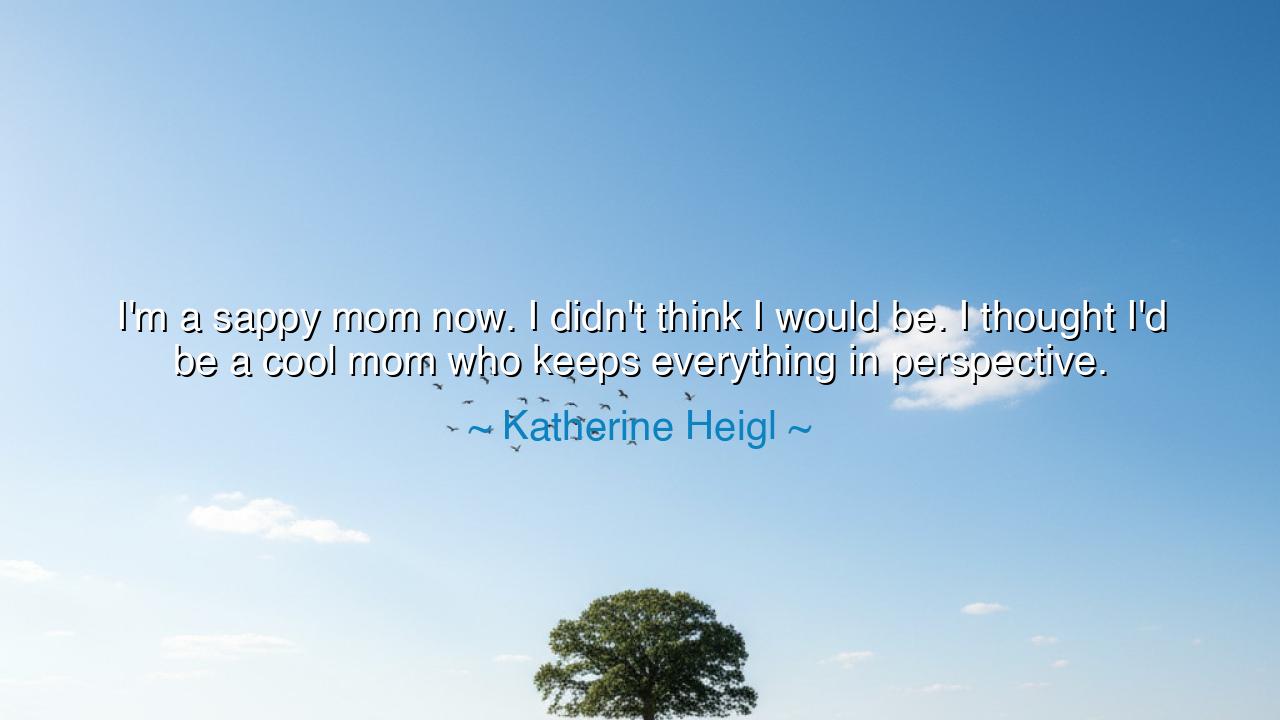
I'm a sappy mom now. I didn't think I would be. I thought I'd be
I'm a sappy mom now. I didn't think I would be. I thought I'd be a cool mom who keeps everything in perspective.






In the journey of life, there are moments when we find ourselves transformed in ways we never expected. Katherine Heigl’s reflection offers a poignant and relatable truth: "I'm a sappy mom now. I didn't think I would be. I thought I'd be a cool mom who keeps everything in perspective." These words speak to the deep, often surprising emotions and intensity of motherhood—how it can challenge the carefully constructed identities we have, and bring out parts of ourselves that we might not have anticipated. Heigl’s admission is a revelation of how the experience of becoming a mother can reshape us in profound, sometimes humorous ways. It is a reminder that life’s most transformative roles often push us beyond our expectations and into new realms of connection and vulnerability.
In the ancient world, the transition from one phase of life to another was marked by rituals and rites of passage. For example, in Greek society, the transition from childhood to adulthood was symbolized by the apprenticeships and trials young men would undergo to prove their worth. Similarly, for women, the journey from maidenhood to motherhood was seen as a profound transformation that could not be anticipated. In Homer’s Odyssey, Penelope, the wife of Odysseus, experiences the slow but inevitable changes brought on by time and motherhood. Her story is one of waiting, of navigating the complexities of love, loss, and duty. Motherhood, even for women like Penelope, was an unexpected calling that reshaped their very being, often in ways they never could have predicted.
Consider the story of Moses, whose mother, Jochebed, defied Pharaoh’s decree and sent her infant son afloat on the Nile in a basket, driven by a love and protection that could not be contained by the law or her circumstances. Her action was not the work of a stoic, reserved woman, but of a mother moved by deep love and emotional instinct. She risked everything for her son’s future, knowing that her emotional instincts far outweighed any desire for personal control or restraint. Just as Katherine Heigl finds herself transformed into a “sappy mom,” Jochebed’s actions reflect how motherhood can change us in ways beyond our control—pushing us to feel deeply and act in ways we never thought we would.
Heigl’s shift from a self-perceived “cool mom” to a “sappy mom” speaks to the unpredictability of parenthood. The image of the "cool mom," one who keeps everything in perspective and maintains emotional distance, is an ideal often promoted in modern culture. However, when faced with the reality of motherhood, many find that emotions—the raw, unguarded feelings of love, care, and fear—take center stage. This emotional transformation is not just about sentimentality; it is about a fundamental shift in how we connect with others. As a mother, Heigl learned that her initial perspective was limited—being a “cool mom” was simply not a sustainable or meaningful approach when it came to the depth of love and responsibility she now felt for her child.
In ancient stories, the role of the mother was often portrayed as both sacrificial and deeply humanizing. The myth of Demeter, the Greek goddess of the harvest, highlights this complex, emotional bond between mother and child. After her daughter Persephone is abducted to the underworld, Demeter’s grief is so overwhelming that it brings about a great famine. Her story teaches us that the bond between mother and child is one of the most powerful forces in the universe, a force that is not easily governed by logic, distance, or restraint. Just as Demeter could not remain detached from her love for her daughter, Heigl’s transformation into a “sappy mom” reveals how deeply motherhood can stir emotions we didn’t even know we were capable of.
The lesson in Katherine Heigl's words is one of embracing the unexpected. In life, we often set out with certain expectations—about who we will be, how we will act, and how we will face challenges. Yet, life has a way of reshaping us, nudging us out of our comfort zones, and leading us to places where we can no longer rely on the ideals we once held. Motherhood—and life in general—has a way of softening us, opening us up to vulnerability, and forcing us to experience life not through an idealized lens, but through the rawness of human emotion. Heigl’s self-admission to becoming a "sappy mom" is an act of embracing the change, of acknowledging that who we think we are may not be who we become, and that growth often happens in the most unexpected ways.
In your own life, think about the roles you have anticipated playing, the expectations you have set for yourself, and how reality may have shifted those expectations. Are you able to embrace those changes with the same grace and acceptance that Heigl has in acknowledging her emotional transformation? Motherhood may be one of the most extreme examples of this, but it’s a universal truth: the roles we take on in life often push us to become more than we imagined, to feel more deeply, and to connect with others in ways we never thought possible. Rather than resisting those emotional shifts, we should welcome them as markers of growth, as powerful reminders that we are never static but always evolving, constantly shaped by the love, responsibilities, and relationships that define us. Just as Heigl has found beauty in her transformation, so too can we find strength in the unexpected changes of our own lives.






AAdministratorAdministrator
Welcome, honored guests. Please leave a comment, we will respond soon